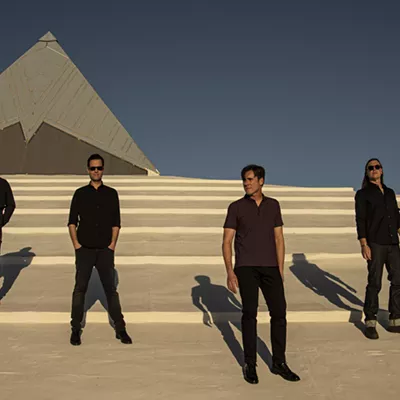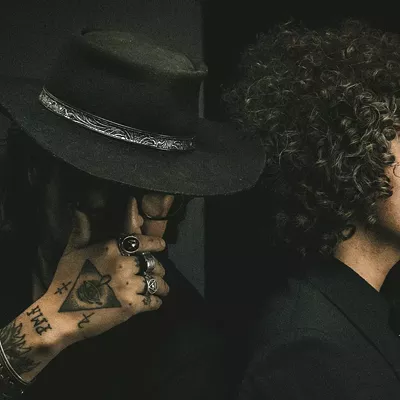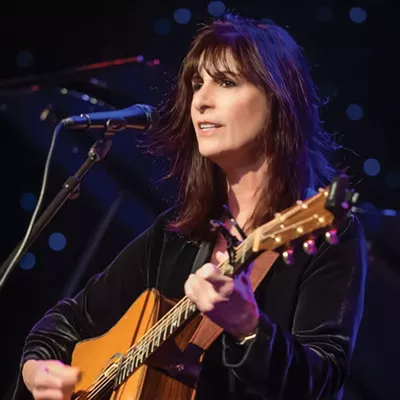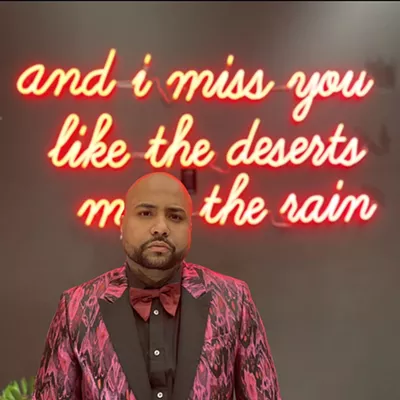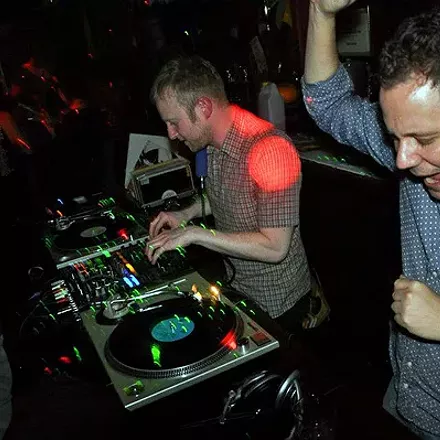Even though George loves playing Germany and has done so six times--as a member of bands such as The Conrads and Rich Hopkins and the Luminarios--the 52-year-old George is proud to say that he is able to make a living staying in this desert town and working three to five nights a week.
Tucson listeners can hear him play live Monday night, March 28, at Plush, where he plays solo slide guitar at least once a month.
George doesn't hide his appreciation for that Fourth Avenue nightclub. "It's probably my favorite place to play in Tucson. I like the fact that there's no TV, no food--just music and booze. It has a nice sound system and a nice atmosphere. They've created a no-smoking section, and come summer, they have these patios, so they'll be able to do more outdoor stuff."
Still, after his first solo concert tour of Deutschland --to promote his recent excellent album Songs From the Loser's Bar--George came home with a little money in his jeans pocket, which is not something that he can depend on when playing the continent with a band.
"There is a niche for solo performers over there," George said last weekend over coffee and a bagel in a downtown diner. "And if you don't mind going it alone and all the hassles and hardships that implies, you can earn a little to come home with.
"You've obviously got lower expenses. There's no back line, no van to rent, no multiple plane tickets, and the booking is easy. Your meals and hotels are usually provided. I was playing small places, and sometimes they were little more than house concerts. But even if it was for 20 or 30 people, they were the sorts of people who stayed and listened to the first song and to the last. They wanted encores, and they bought all my CDs."
Several other Tucson acts--Hopkins, Al Perry, Chris Burroughs, Giant Sand, Greyhound Soul, Calexico and others--have recognized the allure of the Euro and have played extensively across the Atlantic.
"But unless you're Calexico and playing to like 300 or 400 people a night, most band tours barely break even or even lose money in Europe. Just like they do at home." As George says this, a Calexico song threads through the diner, piped in through the joint's sound system.
George is happy to be home with his wife, frequent musical collaborator Lavinia White, and near his parents, who are in their late 70s and live in Tucson. "I couldn't do all this--make a living playing music, touring Germany--without the support I feel at home."
Since he was 13 years old and struggling in raw garage bands, George has been playing music. During the last 40 or so years, he has played rock, blues, country, world music, folk and just about anything else, with such groups as Brain Damage Orchestra, Songtower, The Conrads, Luminarios, 4 Corners and, most recently, Loveland.
For the past several years, George's main pursuit has been singing original tunes and playing slide guitar all by his lonesome on stage. His style of choice has been acoustic country blues, the kind played by such legendary artists as Robert Johnson, Mississippi John Hurt and Rev. Gary Davis.
This is the sound you hear on such albums as Stef's Blue Bait Shop, Point and Pray and Songs From the Loser's Bar, a few of the titles in his catalog of at least 10 albums.
The songs on Loser's Bar feel fresh and original, but at the same time immediately familiar, as if they have been bouncing around your head for years. The CD, by the way, is something of a concept album, reflecting a variety of stories and character studies one might encounter in a daytime bar.
"When I was putting all these character-sounding songs together, it seemed like they were starting to form some sort of pattern," George says. "So then it became sort of a series of mini-assignments for myself. I needed a song to open it, a song about a bartender, a general alcohol song, a song to close it. I was mostly trying to reflect the conversations I hear during the day in bars--that's when the chronics are there--and how they sound and what they talk about."
George notes that bar talk is a great source of songwriting material, because 90 percent of it follows a specific pattern: "There's the standard opening, "I'm not going to bend your ear; I'm not going to tell you my life story,' and then they proceed to tell you their life story."
Like the World War II veteran in the song "Glen Harold," the itinerant traveler in "Home Everywhere I Go" or the protagonist obsessed with a woman's "Snake Tattoo."
It's also important to note that George's material, even though it comes from a very personal place, has evolved beyond the need to be a candid diary, the so-called "me" songs that he abhors.
"There is way too much emphasis in contemporary songwriting on "This is me, my personal statement about life,' and I have at times been one of the worst offenders. But just because it's a real, personal story does not mean it has any relevance for other listeners. And there's a difference between first-person narrative and "me' songs."
Whether he's singing in the first-person or the third, George wants his songs to tell stories that expose "the common link in all human beings."

